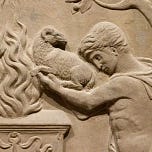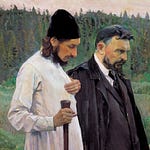This is an updated version of a talk originally given at the Western American Diocese Pastoral Conference in San Francisco, CA, 18 March 2014
CONTINUED FROM A PREVIOUS POST
THE CONCEPT OF FASTING
The Discipline of the Body
There are at least three aspects to the exercise of fasting that seem important. The first one is the discipline of the body. Any time something is limited in its freedoms, it becomes subject to whatever force is limiting it. So, when one makes the body do what he needs instead of what it wants, he becomes its master. In other words, if one tells his feet to walk and where to go, or if he tells his hands to work and what to do, or if the same tells his brain to solve a problem and which one - he gains control over this incredible gift of God called the body. On the other hand, if one’s body forces him to do what it wants, then the body becomes the man’s master. And it would not, perhaps, be so bad if the body wanted what was best for man. Unfortunately, that is not always the case. Each man has his bodily vices yielding to his fallen nature; and in general, we given a choice, the body does not always choose wisely: it naturally wants to preserve energy by staying in bed rather than to expend it on going to church; it wants to eat junk food loaded with calories rather than healthy food; above all perhaps, the body seeks to pass on its genetic material - whether or not the circumstances are appropriate; and our brain just wants to be entertained or get into mischief - often to the detriment of both body and soul.
All of this may sound simple enough, but what is this body, and who is it that should be in charge? The dichotomy of body and soul is not within the scope of our talk, but for simplicity’s sake, let us agree that when we say “body,” we mean the whole of our nature: flesh, including brain, emotions, desires, will, intellect, etc. And the “you” is the hypostatic you, that which tells your brain to solve a math problem and the brain obediently solves it, it is the I in “I love you,” and it is the my in “my name is.” But it so happens that in English, when we say body we often refer to the physical body. This is not, however, the biblical use of the word.
The discipline of the body is exercised for the purpose of developing and maintaining control of the body. In our fallen state, the natural order of our being has been perverted: the flesh with its needs and desires directs man’s activity; the mind is a rationalizing slave of the flesh and is preoccupied with ways to achieve desires of the flesh; the soul follows flesh and mind, looking for pleasure to satisfy its passionate cravings but never finding true and lasting satisfaction; and the spirit - the direction for which our entire being aims - is not that of God, but rather of corruption, waste, and destruction. In other words, the human spirit, the vector, is missing its true mark, which is God. In Christianity, this is known as “sin,” or ἁμαρτία in Greek, which translates as “missing the mark” or “mistake.”
Fasting, then, helps us restore the divinely ordained order to our being: the spirit or vector must always point to God, the soul must find its fulfillment in communion with God, and the body in all of its complexity, must support the soul in her service to God. We may - and will - talk about meat, fish, shrimp and the like, but the main point is: if one cannot be in control of his stomach, if this simple sack of flesh is the ruler of his life, how can he hope to be in control of more complex physiology or mind or soul? This is not even a purely religious matter but a matter of being a properly-ordered human being, of standing right-side-up. There exists an idea in some circles that fasting is outdated, and that educated and enlightened people can exercise their individual freedom by not fasting or by deciding for themselves what to “give up for Lent.” In truth, there is no great freedom in breaking the fast as there is no freedom in refusing to have a healthy diet or to engage in regular physical activity or exercise. People are certainly free to do as they please; Christianity is a voluntary pursuit; Christ does not break down the doors of human hearts but humbly stands at the door and knocks. It is always up to us whether to open that door. But it would be ἁμαρτία to mistake weakness and inability to abstain from certain foods for a true freedom of choice.
Listen to this episode with a 7-day free trial
Subscribe to Phroneo to listen to this post and get 7 days of free access to the full post archives.











